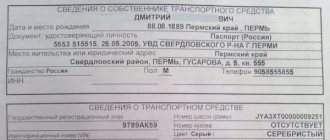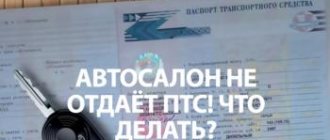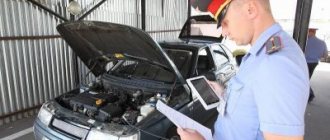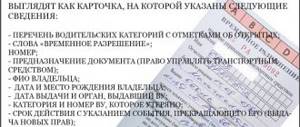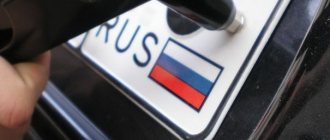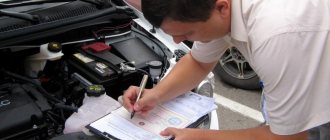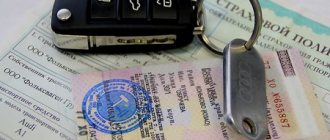When can a fine be transferred to another person?
There are situations when the owner of the car can absolve himself of responsibility for the violation. Usually these are violations from the camera: the electronics do not see who is driving, only the number and make. The camera sends information with the car number and speed to the server. On the server, the data is checked against the database of car owners, and the traffic police issues a fine.
Here are the most common situations:
- the fine did not come for someone else’s car;
- a fine was received for a violation that the driver did not commit;
- the car is registered to one person, but another person drives it - a relative, friend or employee;
- the car was sold, but the new owner did not register its ownership;
- the car was stolen.
Let's figure out what to do in each case.
The most important thing: there are no fines on your car!
So, the first thing we need to understand is that the car itself does not violate traffic rules and is not guilty of anything. All punishments as of 2021 are borne only by people:
- the owner of the car in case of auto-recording by cameras, regardless of who was driving, and then the fine for the car is imposed according to its license plate number,
- a driver when stopped by a traffic police inspector and identified by him as violating the Rules.
However, in the traffic police database, fines are recorded with reference not only to the driver or owner, but also to the car itself. Therefore, even after purchasing such a car, you can see that it has debts.
The fine did not come for my car
When it happens. The camera or the employee who issued the order based on photo violations made a mistake.
What to do. Check whether you entered the correct data during the check - vehicle registration certificate number, license and license plate number.
If there is no error, appeal the decision:
- Write a complaint to the head of the department whose employee issued the fine. The telephone number of the department is indicated in the resolution.
- Attach copies of documents for the car and orders with erroneous data.
- Send a complaint - with a personal visit or registered mail.
- Wait for a response. According to the law, the complaint is considered up to 10 days.
How to check restrictions?
That is why it is important before buying a car to check it not for fines, but specifically for a registration ban.
This is very easy to do on the official website of the traffic police. But to do this, you need to know the VIN of the car with fines that you are going to buy. It is indicated in the PTS, the vehicle registration certificate.
So, the instructions for checking for restrictions are quite simple.
- If you do not have a VIN code, you can get it using your license plate number on a special website.
- Next, go to the car check page on the official website of the State Traffic Inspectorate and paste the previously copied VIN code.
- Scroll down to the very last block “Check for restrictions” and click on the “request verification” link. As a result, you will be given either the presence of a ban or arrests on the car, or you will see that the information was not found - this means that there are no bans on the car due to fines.
If there are no restrictions on the car, then it will look like this:
In this case, still find out whether it is possible to buy a car by checking the presence of fines on its owner; first, it is better to find out his driver’s license number. The fact is that even if there are no prohibitions at the moment, if there are fines in a couple of days - just when you conclude an agreement and come to register your car with the traffic police, they may suddenly appear. Pay attention to the date of the decision when checking - if more than 70 days have passed, then such fines are most likely overdue.
I received a fine for a violation that I did not commit.
When it happens. Cases where a fine is issued by mistake:
- the driver did not exceed the speed limit, but according to the regulation he did;
- the driver was not at the scene of the violation;
- there was no sign or the restriction on it was different;
- crossed the stop line on yellow, not red.
What to do. If the traffic police issued a fine, and at that time you were in another place, for example, on vacation, a business trip or at a doctor’s appointment, provide evidence:
- copies of tickets. If you were on vacation or a work trip, attach copies of your tickets and visa to your complaint if it was a trip abroad. If you haven’t left the city, tickets and receipts from cinemas and cafes will help.
- witness statements. If the resolution indicates the time when you were visiting or in the company of friends, attach to the complaint their testimony that you were with them;
- photos from cameras. If you were given a fine for speeding and you were driving at the speed limit, the camera probably made a mistake and someone else's violation was attributed to you. We'll have to ask for evidence. Traffic cameras take multiple pictures. The inspector who looks at the photo and issues orders is guided by only one photo. To obtain all the images, contact the Unified Data Storage and Processing Center. Read more about how to appeal fines from cameras in another article.
- DVR recording. When there was no speed limit sign or a fine was received for driving through an intersection on red, although the yellow light was on, only a recording from the dash cam will help. Write it down on a disk or flash drive and attach it to the complaint.
The car is mine, but a relative or employee drives it
When it happens. Owners of small fleets register work cars in their name, but hired employees work on them. It also happens that a husband bought a car, but just in case, he included his wife in the MTPL policy. If another person breaks the rules, it is recorded by a camera and the owner receives a fine.
What to do. If the driver is not the owner, but an employee or relative, and the camera recorded a violation, follow the steps:
- Write a complaint to the head of the department whose employee issued the fine. The department's telephone number is written on the resolution.
- Send a complaint - with a personal visit or registered mail.
- Attach an explanation of the true offender.
- Wait for a response. By law, the complaint is required to be considered within 10 days.
Is it possible to buy a car with fines?
Yes. But it's not that simple.
As we have already indicated above, all fines do not hang on the car, but on the driver or its owner with reference to this vehicle. Formally, it is the offender who is responsible for repaying the debt. And such debts have nothing to do with the buyer during the transfer of ownership.
Thus, it is possible to buy a car with fines. But there is an important subtlety - if interim measures have been imposed in connection with the debt of the previous owner, then problems may arise for you as a buyer.
As we know, if a person does not pay a traffic fine on time, the decision is handed over to the bailiffs for enforcement. Bailiffs, in turn, must be endowed by law with the right of influence to force payment of debts. And they have the following rights:
- arrest - we will not touch upon this point in this article, since it is very rarely imposed directly for fines, but most often as an interim measure in judicial proceedings,
- a ban on registration – and this is precisely what can be the main threat.
What is a ban?
This is a kind of response from the state to the failure of a guilty citizen to fulfill the obligation to pay a fine. If you do not pay the debt, then a restriction on registration actions appears on the car. It is produced by the traffic police on the initiative of the bailiffs.
That is, first 10 + 60 days pass for the voluntary payment of the fine, then the State Traffic Inspectorate has the right to transfer the case to the FSSP for forced execution of the decision. They initiate enforcement proceedings and, as one of the security measures, impose a registration ban.
And this is where the biggest risk lies if you plan to purchase a car with fines. Even a change in ownership under a purchase and sale agreement does not legally remove such a restriction from the car. This means that you will not be able to register the car until the previous owner pays such a fine.
But not every fine leads to a registration ban. Firstly, perhaps the deadline for voluntary payment has not yet passed. Secondly, even overdue financial sanctions do not always lead to a ban.
Below we will look at how to check for the presence of such a security measure on a machine. In the meantime, let's look at what to do if you have already purchased a vehicle and decided to check for sanctions.
I sold the car, but the new owner did not register it as ownership
When it happens. Sometimes the new owner does not register the car in his name. When he breaks the rules, the order is issued to the previous owner. The traffic police do not know that a new driver is driving the car and, if the violation is recorded by a camera, they will issue a fine to the previous owner.
What to do. Within 10 days from the date of the decision, contact the traffic police:
- Write a complaint to the head of the department whose employee issued the fine. The department's telephone number is written on the resolution.
- Please attach a copy of the purchase and sale agreement to your complaint.
- Send a complaint - with a personal visit or registered mail.
- Wait for a response. Duration: up to 10 days.
To ensure that fines no longer appear in your name, forcefully stop registering the car. There are two ways:
- remotely - through State Services;
- with a personal visit to the traffic police. Take with you the application, passport and a copy of the purchase and sale agreement.
Department employees will issue a certificate stating that the car is no longer registered with you.
Will they be registered and what are the consequences?
Arrest and ban are real risks that can seriously complicate your car life - up to the impossibility of operation and even the risk of losing the car with the cloudy prospect of extracting the money paid for it from the debtor seller.
Therefore, when buying a car, it is important to do important things:
- check the car for registration restrictions by VIN code on the traffic police website or the bailiffs website,
- check for fines from the previous owner using the registration certificate on the official website of the traffic police,
- As soon as possible after concluding the purchase and sale agreement, register the car in your name.
If at the moment you are in a situation between the first and second points (you checked the car for fines, found them, but have not yet registered the car in your name), then we recommend changing the owner as soon as possible. But before that, you need to check if the registration ban is already on the car - according to the first point, then we move on to the next one.
What to do if you bought a car and there are fines on it - infographics
If there is a ban?
So, you bought a car, and it turned out to have unpaid fines from the previous owner of the car, in addition, a registration ban was imposed on the vehicle as a result of an inspection.
A registration ban is a restriction of registration actions in the traffic police. Such actions include changing the owner of the vehicle. We discussed the registration ban in more detail in our special article; we also have complete instructions for registering a car.
In our situation, there are two options for imposing restrictions on which further actions depend:
- the ban was imposed after the conclusion of the purchase and sale agreement due to fines of the previous owner of the car - then it was imposed illegally, and we move on to reading the instructional article on removing such restrictions,
- the restrictions were imposed a long time ago, and you bought a car with a registration ban.
The last case is the worst. Here, in fact, there are only 2 ways out of the situation for you:
- convince the seller to pay fines on the car,
- You must pay these fines yourself.
Oh yes, there is a third option - ride without registration. In this case, you will need to either constantly renew the purchase and sale agreement, or drive as is - in an unregistered car. There are sanctions for this: for the first time a fine of 800 rubles, in subsequent cases - up to deprivation of rights. But according to the law, it is not your fault that the prohibition exists; you are a bona fide party to the car purchase and sale transaction. The bad news is that the traffic police inspector on the road will most likely still issue a fine or a protocol for deprivation, and you will have to defend your position further.
But there is another risk of the latest scheme...
Calculate the cost of your MTPL policy
Arrest
Sooner or later, if the fines are not paid for a long time, and the bailiffs have initiated enforcement proceedings on them, the ban may turn into the seizure of the car. In practice it works like this:
- You are driving on the road in a car with unpaid fines from the previous owner, which has been subject to arrest,
- as part of one of the raids of the bailiffs together with the traffic police, an inspector stops you, and the bailiff sitting next to him in his car checks the license plates of the car for debts, finds an arrest warrant,
- as a result, the car can be taken away legally on the road,
- All you have to do is terminate the sales contract and claim back the money paid for the car.
There is one common myth that supposedly only the bailiff who is handling the case can take away a purchased car when it has fines as part of an arrest. But that's not true. The only good news here is that for 2021, the bailiff databases do not overlap between regions. Therefore, if you were stopped in another region, the bailiffs may not see the existence of a ban and arrest.
Something else useful for you:
- Bailiffs have banned the registration of a car due to the previous owner - how to remove it?
- All about the ban on registration actions in questions and answers
- How to check a car for seizures?
The car was stolen
When it happens. The driver goes to the store for a couple of hours and parks the car nearby. He returns - there is no car. I don’t want to think about theft, so first the driver calls the paid parking service and asks if the tow truck has taken his car. While the driver is trying to find out if the car is in the impound lot, the thief manages to get a fine from the camera.
What to do. To appeal a fine from a car thief, contact the traffic police:
- Write a complaint to the head of the department whose employee issued the fine. The department's telephone number is written on the resolution.
- Attach a copy of the application to initiate criminal proceedings to the complaint.
- Send a complaint - with a personal visit or registered mail.
- Wait for a response, up to 10 days.
Alexander Torvard, auto lawyer In my practice, there was a case when the driver left the car at the car wash for several hours, and the car washers went to the store to buy alcohol. They were drunk and got into an accident on the way. It was easy to prove their guilt, but this is not always the case.
Let’s imagine that the washers went for a drive, broke the rules and returned to the wash. In this case, it is necessary to collect evidence that at that time the car was in the wash, and you were not in the car. Such evidence may include receipts and reports of work performed from the car wash, as well as testimony from witnesses that you were seen at that time in another place. You can also attach receipts from a cafe or cinema during this time.
If the thief is a professional and steals a car for sale, he will most likely move carefully, without attracting the attention of inspectors and cameras. If the owner nevertheless received a fine from the camera and is sure that the car was stolen, such a fine can be appealed.
Remember
- If the driver did not violate the rules, he can appeal the fine or transfer it to another.
- You received a fine for someone else's car - check the car details and appeal to the traffic police.
- In the resolution, someone else’s violation - prove it. Recordings from traffic cameras and DVRs, witness statements and receipts from the places where you were at the time of the violation will help.
- A relative or employee has violated the law - attach his explanation to the complaint.
- The buyer of a car is in no hurry to register it in his own name - contact the traffic police and deregister it yourself.
- The car was stolen and a fine was received - appeal the decision and attach a statement to initiate a criminal case.
All articles by the author: Evgeniy Lesnov
